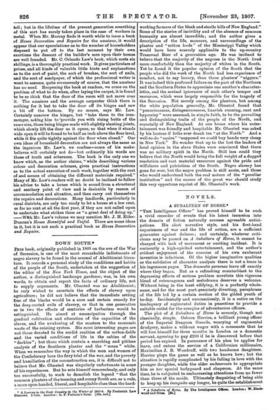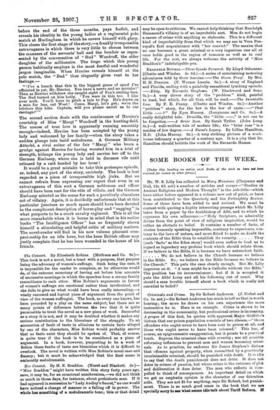NOVELS.
A SUBALTERN OF HORSE.*
"THE Intelligence Officer" has proved himself to be such a vivid recorder of events that his latest incursion into the domain of fiction naturally arouses agreeable antici- pations. His alert narrative style, and his first-band experiences of war and the life of action, are a sufficient guarantee against dulness ; and certainly, whatever criti- cisms may be passed on A Subaltern of Horse, it cannot be charged with lack of movement or exciting incident. It is eminently a high-spirited entertainment, and the author's evident enjoyment of the exercise of his own exuberant invention is infectious. Of the higher imaginative qualities or the subtleties of character analysis there is not a trace in his ingenuous pages. The dramatis personae leave off exactly where they began. But as a refreshing counterblast to the depressing efforts of serious problem novelists this vigorous blend of extravaganza and melodrama deserves a welcome. Without being in the least edifying, it is a perfectly whole- some, and for the most part genuinely diverting, paraphrase of the life led by a certain section of the gilded youth of to-day. Incidentally and unconsciously, it is a satire on the inadequacy of regimental duties in peacetime to provide a suitable outlet for the energies of adventurous officers.
The plot of A Subaltern of Horse is severely, though not classically, simple. Osborn Herries, a brilliant young officer of the Imperial Dragoon Guards, wearying of regimental drudgery, makes a wild-cat wager with a niessmate that he will lose himself for three months in London as a domestic servant, agreeing to pay £200 if he is discovered before that period has expired. In pursuance of his plan he applies for leave, and enters the service of a Californian millionaire, Maximilian J. B. Woodruff, with two handsome daughters. Herries plays the game as well as he knows how; but the situation is rapidly complicated by his falling in love with the younger daughter, while the elder endeavours to appropriate him as her special bodyguard and chaperon. At the same time, he is subjected to embarrassing attentions from no fewer than three of the maids. Ultimately despairing of being able to keep up his incognito any longer, he quits the establishment
* A Subaltern of Horse. By The Intelligence Officer, London; W. Black. wood-and Sonia [Goa
before the end of the three months, pays forfeit, and
reveals his identity to the young ladies at a regimental polo match at Hurlingham in which he covers himself with glory.
This closes the first stage of the story,—a frankly irresponsible extravaganza in which there is very little to choose between the manners of the servants' ball and the boudoir as repre- sented by the conversation of " Bud " Woodruff, the elder daughter of the millionaire. The lingo which this young
person habitually employs is the most fearful and wonderful jargon imaginable. When Herries reveals himself at the polo match, the " Bud " thus elegantly gives vent to her
feelings :— "` I've a hunch that this is the biggest game of spoof I've officiated in yet, Mr. Herries. You have a nerve and no mistake !' Then as Herries withdrew she caught sight of Fox's smiling face. The Bud turned on him hotly. ' You were in this too. I like your neck. You'll have to pitch a tale to Pop. He's drawn on a man for less, out West ! Come, Margi, let's get; we're the lobsters this hike. Captain, will you please escort us to our carriage ? ' " The second section deals with the continuance of Herries's courtship of Miss " Margi " Woodruff in the hunting-field.
The course of true love is apparently running smoothly enough—indeed, Herries has been accepted by the young lady and welcomed by her family—when the story takes a sudden plunge into lurid melodrama. A German Military Attaché, a rival suitor of the fair "Margi" who bears a grudge against Herries for having worsted him in a trial of strength, kidnaps the young lady and carries her off to the German Embassy, where she is held in durance vile until released by a raid headed by her lover !
It would be a great mistake to take this grotesque episode, or, indeed, any part of the story, seriously. The book is best regarded as a piece of irresponsible high jinks. But we cannot refrain from expressing our regret that even in an extravaganza of this sort a German nobleman and officer should have been cast for the role of villain, and the German Embassy selected as the scene for such a peculiarly obnoxious act of villainy. Again, it is decidedly unfortunate that at this particular juncture so much space should have been devoted to the complacent description of horse-play and " ragging " in what purports to be a crack cavalry regiment. This is all the more remarkable when it is borne in mind that in his earlier books "The Intelligence Officer" has so frequently shown himself a stimulating and helpful critic of military matters. The novel-reader will find in his new volume pleasant com- panionship for an idle hour, but the keen British officer may justly complain that he has been wounded in the house of his friends.



















































 Previous page
Previous page